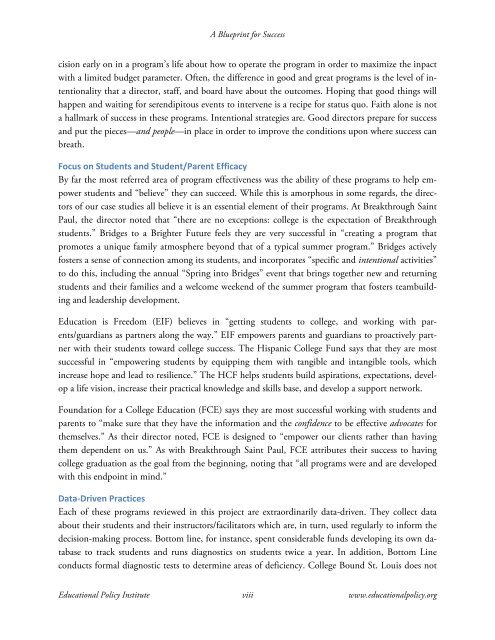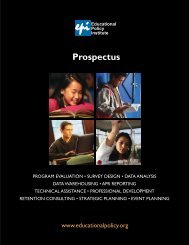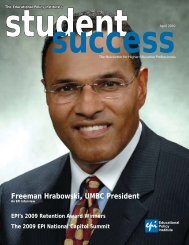A BluePrint for Success: Case Studies of Successful - Educational ...
A BluePrint for Success: Case Studies of Successful - Educational ...
A BluePrint for Success: Case Studies of Successful - Educational ...
Create successful ePaper yourself
Turn your PDF publications into a flip-book with our unique Google optimized e-Paper software.
A Blueprint <strong>for</strong> <strong>Success</strong><br />
cision early on in a program’s life about how to operate the program in order to maximize the inpact<br />
with a limited budget parameter. Often, the difference in good and great programs is the level <strong>of</strong> intentionality<br />
that a director, staff, and board have about the outcomes. Hoping that good things will<br />
happen and waiting <strong>for</strong> serendipitous events to intervene is a recipe <strong>for</strong> status quo. Faith alone is not<br />
a hallmark <strong>of</strong> success in these programs. Intentional strategies are. Good directors prepare <strong>for</strong> success<br />
and put the pieces—and people—in place in order to improve the conditions upon where success can<br />
breath.<br />
Focus on Students and Student/Parent Efficacy<br />
By far the most referred area <strong>of</strong> program effectiveness was the ability <strong>of</strong> these programs to help empower<br />
students and “believe” they can succeed. While this is amorphous in some regards, the directors<br />
<strong>of</strong> our case studies all believe it is an essential element <strong>of</strong> their programs. At Breakthrough Saint<br />
Paul, the director noted that “there are no exceptions: college is the expectation <strong>of</strong> Breakthrough<br />
students.” Bridges to a Brighter Future feels they are very successful in “creating a program that<br />
promotes a unique family atmosphere beyond that <strong>of</strong> a typical summer program.” Bridges actively<br />
fosters a sense <strong>of</strong> connection among its students, and incorporates “specific and intentional activities”<br />
to do this, including the annual “Spring into Bridges” event that brings together new and returning<br />
students and their families and a welcome weekend <strong>of</strong> the summer program that fosters teambuilding<br />
and leadership development.<br />
Education is Freedom (EIF) believes in “getting students to college, and working with parents/guardians<br />
as partners along the way.” EIF empowers parents and guardians to proactively partner<br />
with their students toward college success. The Hispanic College Fund says that they are most<br />
successful in “empowering students by equipping them with tangible and intangible tools, which<br />
increase hope and lead to resilience.” The HCF helps students build aspirations, expectations, develop<br />
a life vision, increase their practical knowledge and skills base, and develop a support network.<br />
Foundation <strong>for</strong> a College Education (FCE) says they are most successful working with students and<br />
parents to “make sure that they have the in<strong>for</strong>mation and the confidence to be effective advocates <strong>for</strong><br />
themselves.” As their director noted, FCE is designed to “empower our clients rather than having<br />
them dependent on us.” As with Breakthrough Saint Paul, FCE attributes their success to having<br />
college graduation as the goal from the beginning, noting that “all programs were and are developed<br />
with this endpoint in mind.”<br />
Data-‐Driven Practices<br />
Each <strong>of</strong> these programs reviewed in this project are extraordinarily data-driven. They collect data<br />
about their students and their instructors/facilitators which are, in turn, used regularly to in<strong>for</strong>m the<br />
decision-making process. Bottom line, <strong>for</strong> instance, spent considerable funds developing its own database<br />
to track students and runs diagnostics on students twice a year. In addition, Bottom Line<br />
conducts <strong>for</strong>mal diagnostic tests to determine areas <strong>of</strong> deficiency. College Bound St. Louis does not<br />
<strong>Educational</strong> Policy Institute viii www.educationalpolicy.org




